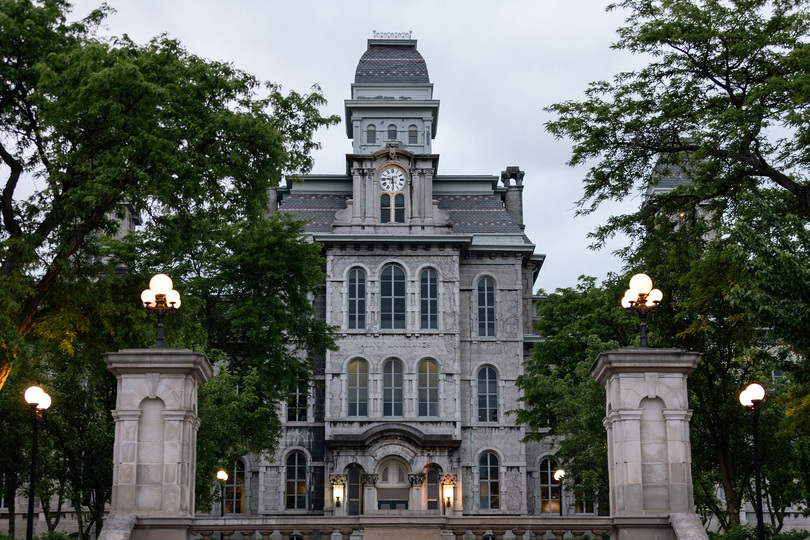Opinion: Consider humanities’ modern value during Arts & Sciences pauses

SU's decision to pause admission into certain majors in the College of Arts and Sciences has sparked confusion among students. Our columnist argues these programs serve a vital purpose and help foster critical thinking surrounding societal issues. Joe Zhao | Senior Staff Photographer
Get the latest Syracuse news delivered right to your inbox.
Subscribe to our newsletter here.
Syracuse University’s recent decision to pause 20 majors in the College of Arts and Sciences caught most of my peers and me by surprise. I was sitting in class when my professor told us these majors would no longer be available for incoming applicants and transfers.
After hearing this news, my biggest question was how these programs were chosen to target. Though the university has cited declining enrollment, I don’t feel this is a valid reason to pause their enrollment.
Humanities enrollment has continued to decline over the last ten years in colleges across the country, and lots of universities have cut fundings for these programs.
Enrollment fluctuation is often in response to external factors such as job prospects or parental pressure, and people are less likely to pursue a degree in the arts or languages, especially in a volatile economy, according to The Wall Street Journal.
My classes for my minor in French and Francophone studies only have three faculty members, which is a common theme in other language programs.
Considering how small the program is, it feels personal for it to be paused. It enforces the idea that these studies aren’t valued.
I believe that the faculty and professors care a lot about what they teach, and I see their passion in my classes everyday. I also feel, though, that this decision gives the impression that the largest consideration is numbers on a paper. SU must reconnect with what’s actually important to its students in the broader context of higher education.

Zoey Grimes | Design Editor
Studying the humanities results in a more diverse array of choices upon graduation. It teaches us the ability to think critically, write, read and understand historical and cultural contexts for whatever industry we choose to pursue down the road. SU must not support this neglectful narrative, or it will only limit the thinking of its students.
Today’s political climate makes humanities more important than ever. The programs under review are the ones that foster connection, understanding and growth. Today, we see a country that prioritizes production, profit and division over such ideas. Censoring topics like African American Studies and language courses will widen this divide.
Middle Eastern studies, Latin-American studies and religion are highly relevant topics to offer, especially for a university that cites “culture, community and change” as one of its four pillars of distinctive excellence. How can this be one of SU’s values if the university has paused so many programs that seek to teach culture and community?
The rapid shrinking of these programs the university cites is due to disregard, and suspending them only perpetuates this cycle.
SU shouldn’t support the misconception that studying the humanities will force students into a low-value job. Rather, these degrees set you up for more options in the future with a higher return on investment. They build the foundation for more advanced degrees and thus a wider array of high-paying careers, as opposed to a degree in STEM which can typically only set you up in one domain.
Focusing only on a post-graduation salary continues to promote the idea that higher education is just for job-training, and that the only purpose of pursuing a degree at an institution like SU is to make a larger salary after graduation.
It isn’t reasonable to expect everybody to major in humanities, but these topics are valuable in cultivating knowledge. We must pour more effort into what will make us better people, not just what will make us the most money.
SU needs to stand up for these undervalued programs. Otherwise, they don’t stand a chance in the long run. This only becomes more apparent as finance, engineering and business programs remain untouched.
The point of pursuing higher education is to be taught how to be cultivated citizens. We should get excited about learning and highlighting our connections to the past, present and future. We should care about these topics because even if something like Modern Jewish Studies doesn’t seem pertinent to many students, it is for some. That should matter.
Whether these majors are money-makers or not, they still serve a purpose. They teach us to be well-rounded, well-read people of the world. They teach us things that we would not think to look for otherwise. Language programs and global studies show us how important it is to understand things we otherwise would have no clue about.
SU needs to listen to the concerns of the A&S faculty and its students because our voices matter and the humanities are fundamental to our education, whether we realize it now or not.
Helena Sauriat is a sophomore majoring in anthropology. She can be reached at hrsauria@syr.edu.





